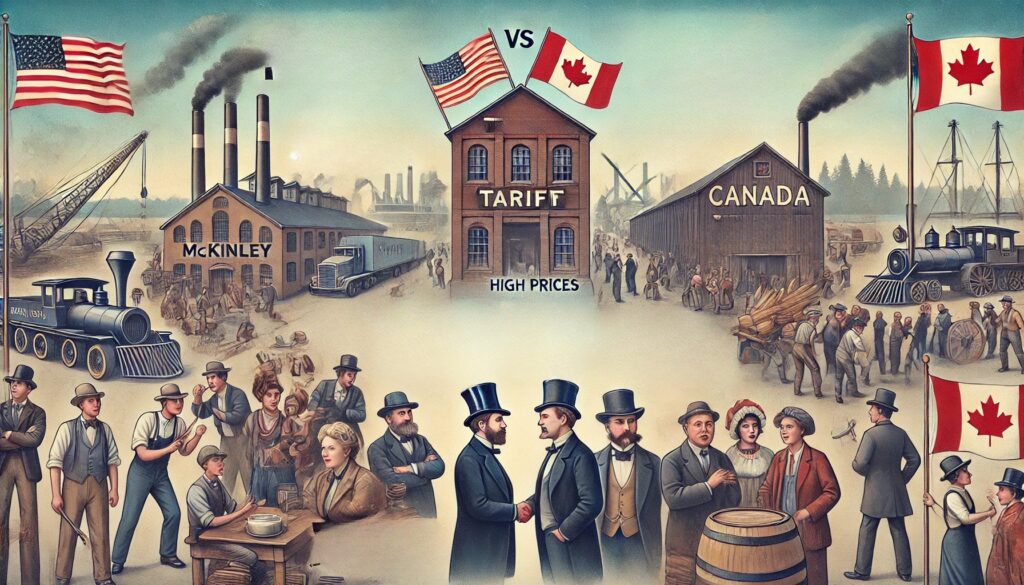McKinley Tariff: 3 Impact on Modern Canada-U.S. Trade

The McKinley Tariff, passed in 1890, was a U.S. law that raised taxes on imported goods, especially manufactured items and farm products. Named after Congressman William McKinley, the goal was to protect American businesses from foreign competition, including producers in Canada and Europe. However, this led to higher prices for U.S. consumers, trade tensions, and retaliatory tariffs from other countries, especially Canada.
Today, the impact of the McKinley Tariff can still be felt. Trade disputes between the U.S. and Canada continue, with tariffs on products like steel, aluminum, softwood lumber, and dairy. These modern issues show how protectionist policies remain a major part of cross-border trade talks.
The McKinley Tariff: A Historical Perspective
The McKinley Tariff, passed in 1890, raised import taxes to nearly 50%, making it one of the highest tariffs in U.S. history. Its main goal was to protect American businesses by making imported goods more expensive. While this helped some local industries, it also caused serious problems.
Higher Prices for American Consumers – With fewer cheaper imports available, American-made goods became more expensive. Everyday people had to pay more for basic items, which reduced their buying power.
Canadian Retaliation – In response to the McKinley Tariff, Canada introduced its own tariffs on U.S. exports, especially farm products. This hurt American farmers and created tension between the two countries.
Political Backlash – Many farmers and citizens were unhappy with the effects of the tariff. The public backlash led to big losses for the Republican Party in the 1892 election. This eventually led to the repeal of the McKinley Tariff and its replacement by the Wilson-Gorman Tariff Act in 1894.
Even though the McKinley Tariff was short-lived, it had a long-lasting impact. It set the stage for future protectionist trade policies, especially in U.S.-Canada relations. Its history reminds us that tariffs often bring unintended costs.
How Protectionism Lives On: Canada-U.S. Tariffs Today
Although the McKinley Tariff was passed more than 130 years ago, trade tensions between the U.S. and Canada are still a major issue today. The protectionist ideas behind the McKinley Tariff continue to show up in modern trade policies, especially in key industries like steel, lumber, and dairy.
1. Steel and Aluminum Tariffs
In 2018, the U.S. government used national security as a reason to place high tariffs on steel (25%) and aluminum (10%) from other countries, including Canada. These tariffs, known as Section 232 tariffs, hurt Canadian exports and led Canada to respond with its own tariffs on U.S. goods like food and household items. While these tariffs were removed in 2019, they revealed how quickly trade tensions can rise—just like during the McKinley Tariff era.
2. Softwood Lumber Disputes
The U.S. has long claimed that Canada gives unfair support to its softwood lumber industry. Because of this, the U.S. has placed duties on Canadian lumber many times. This trade fight has lasted for decades, with many rounds of tariffs, countertariffs, and legal battles. Like the McKinley Tariff, these duties raise costs—especially for American homebuilders and buyers.
3. Dairy and Agricultural Restrictions
Agriculture was a major debate point during the creation of the U.S.-Mexico-Canada Agreement (USMCA), which replaced NAFTA in 2020. The U.S. pushed for more access to Canada’s dairy market, arguing that Canada’s system of price controls gave an unfair advantage. Although some changes were made, dairy remains a sensitive and political issue—just as it was during the time of the McKinley Tariff.
Lessons from the McKinley Tariff:
-
Tariffs Can Backfire: Just like the McKinley Tariff led to higher prices and retaliation in the 1890s, today’s tariffs can cause trade wars, hurt supply chains, and increase prices for both countries.
-
Protectionism Creates Tension: History shows that tariffs often harm relationships. The U.S. and Canada have both felt the strain from these ongoing disputes.
-
Free Trade Brings Stability: Removing the McKinley Tariff helped open the door to freer trade. Deals like NAFTA and USMCA try to keep trade fair and balanced, though challenges remain.
The McKinley Tariff is an important example of how protectionism can lead to more problems than solutions. Passed in 1890, this U.S. law raised taxes on imported goods to protect American industries. While the goal was to support local businesses, the result was quite different. The McKinley Tariff caused prices to go up for consumers and led to trade tensions with countries like Canada. In response, those countries put their own tariffs on American goods, creating a cycle of retaliation that hurt both sides.
Today, we still see similar issues in U.S.-Canada trade relations. From steel and aluminum to softwood lumber and dairy, tariffs continue to cause conflict between the two countries. These modern disputes show that the problems caused by the McKinley Tariff are not just history—they are still relevant.
The lesson is clear: while tariffs may seem like a quick fix to protect certain industries, they often bring higher costs and strained relationships. Policymakers in both Canada and the U.S. should look to the past. The story of the McKinley Tariff shows that cooperation and fair trade usually lead to better long-term results than confrontation and protectionism.




